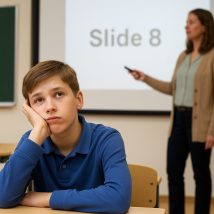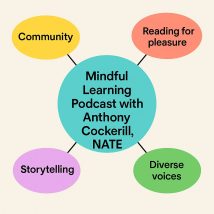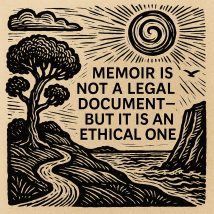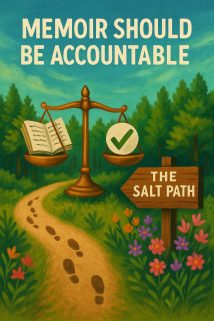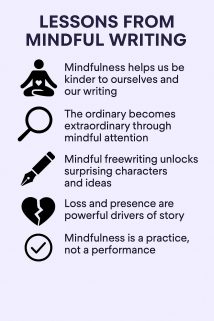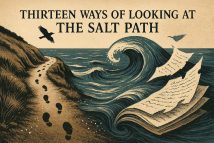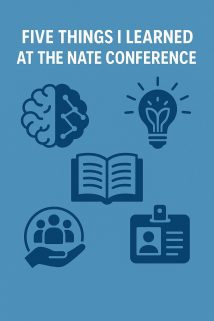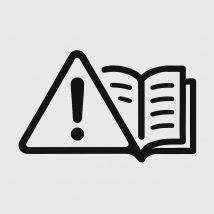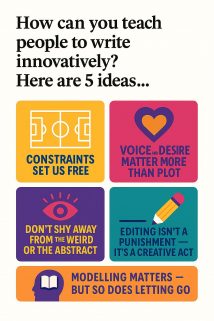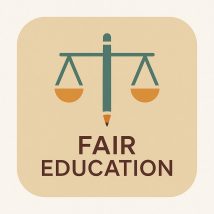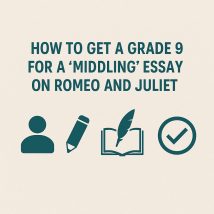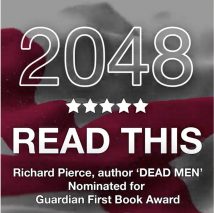Key concept
The main theme or keyword of a particular post, maybe with reference to a teaching or national curriculum topic.
-
Five Things English Teachers Can Teach Us About Reading, Writing, and Living
I recorded this episode of the Mindful Learning Podcast with Anthony Cockerill, director of the National Association for the Teaching of English (NATE), because I believe English teachers have so much to teach us beyond the classroom. Our conversation was a chance to explore what reading, writing, and language mean for all of us as human beings, not just for students in schools. Anthony spoke passionately about the life-changing power of reading for pleasure, the way writing can help us respond to and reflect on life, and the importance of valuing every community’s language. He reminded me that stories shape who we are and that teaching thrives best in community, not in isolation. These are not just classroom lessons — they are life lessons. I wanted to share this podcast because, at a time when education is often framed in narrow, utilitarian terms, we need to remember the broader value of English. Reading, writing, and language are not luxuries; they are ways of being human, of building empathy, resilience, and imagination. Listen to the full conversation and read the blog here: 👉 https://www.francisgilbert.co.uk/2025/09/five-things-english-teachers-can-teach-us-about-reading-writing-and-living/
-
What Kind of School Parent Are You?
🦒🦊🐆 What kind of parent are you when it comes to your child’s education? I’ve spent decades working in education, as a teacher, author, and now as Dr Francis Gilbert, Head of Education at Goldsmiths, University of London. I’ve written two books for parents about navigating schools, Parent Power and Working the System, and while they’re over a decade old, revisiting them recently reminded me how little has changed. The system is still confusing. The stakes are still high. And parents are still left feeling overwhelmed by league tables, playground gossip, and hidden admissions rules. That’s why I’ve created this quiz. It’s short, fun—and surprisingly revealing. You’ll discover your instinctive parenting style when it comes to education. Are you a Giraffe? A Fox? A Wildebeest? Each result comes with advice you can actually use. 🎯 It’s more timely than ever—because your approach as a parent really does shape your child’s experience at school. 📥 Take the quiz and download the free printable version from my website. 👉 If you’re reading this on Instagram, you’ll need to paste the link into your browser to access the full article and quiz. #Parenting #SchoolAdmissions #EducationMatters #ParentPower #FrancisGilbert #Goldsmiths
-
Eight Transformative Moments from Our Reciprocal Teaching Day at Goldsmiths
🖋️ “It didn’t have to be clever. It just had to be true.” At a recent MA Creative Writing and Education sharing day, alumna Maryam Ahmadi led a powerful storytelling session exploring how fables can carry emotional and moral truths that essays and arguments often can’t. The bold linocut-style image here captures the spirit of the session: a teacher and group of students surrounded by symbols of learning and connection—a heart, a lightbulb, a book, and leaves. A chalkboard shows the simplest of equations: 1 + 1, reminding us that real learning is reciprocal. When we share stories, we’re not just transmitting knowledge—we’re transforming one another. Maryam began by reading Patrick and Flippa, a deceptively gentle children’s book about a lonely polar bear and a persistent penguin. The group then wrote their own fables, revealing themes of exile, regeneration, defiance, and hope. One participant wrote about a deer who could only speak in questions. Another told of a fish who forgot how to swim in clean water. These were not writing exercises. They were acts of quiet truth-telling. 💡 As one attendee put it: “It’s easier to say something difficult through the story of a fox. You get closer without flinching.” 📚 This workshop was part of the MA in Creative Writing and Education at Goldsmiths, University of London—a unique programme where writers become educators, and educators deepen their creative practice. 🔗 Find out about the MA: www.gold.ac.uk/pg/ma-creative-writing-education/ #MACreativeWritingAndEducation #GoldsmithsUniversity #StorytellingAsPedagogy #MindfulTeaching #Fables #CreativeWritingWorkshop #WritingToHeal #WritingToLearn #RadicalPedagogy #TeacherWriter #ReciprocalLearning
-
Six Things The Salt Path Can Teach Us About Publishing, Truth, and the Power of Memoir
I wrote this blog after reflecting on The Salt Path by Raynor Winn and its powerful impact, not just as a personal story, but as a case study in how publishing shapes truth, healing, and cultural desire. Drawing on over a decade of teaching creative writing and publishing, I explore what the book teaches us about agents, editors, marketing, and the ethics of memoir. 👣 Who decides what gets published—and how truth is framed? 📚 Why do memoirs like this resonate so deeply? 🧭 What role does publishing play in offering hope or illusion? 🔗 Read the full post here: https://www.francisgilbert.co.uk/2025/07/six-things-the-salt-path-can-teach-us-about-publishing-truth-and-the-power-of-memoir/ #TheSaltPath #RaynorWinn #PublishingEthics #CreativeWriting #Memoir #Pedagogy #WritingLife #FrancisGilbert #Goldsmiths
-
How Much Truth Is Enough? Reflecting on Raynor Winn’s Response to The Observer
What happens when the story you loved starts to shift? In this piece, I explore Raynor Winn’s recent public defence of The Salt Path—a statement both moving and evasive. While condemning the abuse Winn has received, the article interrogates what her response reveals (and conceals) about the ethics of memoir. Did the omissions distort the truth? What kind of trust do memoirists owe their readers? And when real-life complexities surface, do they deepen a story—or destabilise it? This isn’t about cancellation—it’s about accountability, narrative framing, and the quiet power of what’s left unsaid. #MemoirEthics #RaynorWinn #TheSaltPath #NarrativeTruth #LifeWriting #CreativeNonfiction #MindfulWriting #EthicalStorytelling #WritingCommunity
-
Ten Ethical Complexities of Memoir: After The Salt Path, and Two Decades After My Own
In my last post, I explored Thirteen Ways of Looking at The Salt Path. This follow-up dives deeper. Raynor Winn’s The Salt Path moved many. But recent reporting has raised ethical questions about omission, accountability, and the seduction of “emotional truth.” What are the responsibilities of the memoirist—especially when their story brings them sympathy, sales, or status? In this new article, I reflect on my own memoir—and what I got wrong. I explore what I’ve learned as a writer, teacher, and mentor of emerging voices on the MA in Creative Writing and Education at Goldsmiths. 🧭 Memoir is a journey, not a monument. 🕊️ Truth needs ethics, not just emotion. 🌊 The Salt Path leads us to difficult but necessary questions. 🔗 Link in bio/comments #MemoirMatters #EmotionalTruth #CreativeWriting #TheSaltPath #EthicalWriting #FrancisGilbert #WritersOfInstagram #NonFictionNarratives #GoldsmithsWriters
-
Five Reasons Why Mindfulness and Creative Writing Weave Together Well
What happens when we stop judging our writing—and simply listen? In this new blog post, I reflect on a recent workshop where writers used mindfulness to unlock voice, memory, and emotion. Together we explored how freewriting, object meditation, and mindful noticing can transform both what we write and how we feel about writing. Participants wrote about lipstick, tissue packets, Kindles—and discovered surprising characters, deep emotional truths, and stories of presence, loss, and joy. These moments reminded us that mindfulness is not about calming down—it’s about showing up. Drawing on my book The Mindful Creative Writing Teacher (Gilbert, 2025) and C. T. McCaw’s concept of “thick mindfulness,” I share five practical and poetic takeaways from the session. If you teach, write, or are simply curious about the link between awareness and creativity, this one’s for you. 💡 Read now and see how mindful writing can be radically freeing. #MindfulWriting #CreativeWritingTeacher #Freewriting #MindfulnessInEducation #WritersOfInstagram #AmWriting #WritingWorkshop #GoldsmithsUniversity #FrancisGilbert #WritingPrompt #MindfulLiving
-
Thirteen Ways of Looking at The Salt Path After the Truth Came Out
I wrote this blog because, like so many readers, I had been profoundly moved by The Salt Path and felt shocked and saddened by the revelations in The Observer’s investigation. My piece, Thirteen Ways of Looking at The Salt Path, reflects the emotional complexity of this moment. It explores how we process betrayal, how beauty can be real even when built on broken foundations, and how storytelling must be held to ethical account. This is not a takedown. It is not an attempt to erase what people found meaningful in Sally and Tim Walker’s journey. Instead, it is an invitation to hold the story up to the light and examine its layers. I use the structure of Wallace Stevens’ poem Thirteen Ways of Looking at a Blackbird to acknowledge the many truths that can coexist, and the importance of distinguishing between them. This is a moment for honesty in publishing, compassion for those misled, and responsibility for those harmed. It is also a call for readers, writers, and teachers to think more deeply about what it means to tell the truth. I hope this blog opens a space for reflection and dialogue, about literature, justice, and the real salt of life.
-
Why English Teaching Still Matters: Insights from the 2025 NATE Conference
What does it mean to teach English with creativity, care, and courage in 2025? At this year’s NATE (National Association for the Teaching of English) conference, I joined a passionate group of teachers, academics, publishers, and educational innovators, some seasoned, others just starting out, to explore that very question. In this new blog post, I reflect on five powerful lessons from a day filled with poetic metaphors, Generation Alpha pedagogy, and mindful creative writing. From Clare Lawrence’s unforgettable lentil metaphor, to conversations about inclusive teaching for a post-2010 cohort, to the joyful solidarity of English educators nationwide: this was a conference where research met emotion, and practice met possibility. I also had the pleasure of leading a mindful creative writing workshop, inspired by my book The Mindful Creative Writing Teacher (Gilbert, 2025), and saw first-hand how freeing and transformative creative writing can be when rooted in reflection rather than performance. If you care about teaching English in ways that centre imagination, identity, and student voice, and want to explore this further, take a look at our MA in Creative Writing and Education at Goldsmiths. 🔗 MA info: https://www.gold.ac.uk/pg/ma-creative-writing-education/ #MindfulWriting #NATE2025 #CreativePedagogy #EnglishTeachers #TeacherCommunity #FrancisGilbert #MindfulCreativeWritingTeacher
-
Five Things We Can Learn from Faking Hitler: Lies, Truth, and the Seduction of Fiction
I wrote this piece after finishing Faking Hitler, the German drama now streaming on Channel 4. It’s a gripping, ironic, and surprisingly funny retelling of the Hitler Diaries scandal, a real event where forged Nazi documents were sold to Stern magazine in the 1980s. What drew me in wasn’t just the slick production or the fascinating story, but the deeper questions the series raises about truth, memory, and the fictions we choose to believe. This drama isn’t just about a historical hoax; it’s about our relationship with the past — and how easily we rewrite it. Through sharp writing and unforgettable performances, Faking Hitler explores how trauma, ambition, ideology, and denial can cloud even the sharpest minds. It’s a series that resonates disturbingly with our own times, when truth feels fragile and authoritarian myths resurface in new forms. I wanted to unpack five key takeaways from the show — about journalism, fascism, generational reckoning, and the seductive power of lies. This article is my attempt to make sense of a drama that is as psychologically rich as it is entertaining. If you’re interested in truth, fiction, or the strange space in between, read on. #FakingHitler #Channel4 #MediaEthics #Fascism #TruthAndFiction #BlogPost #CriticalMediaLiteracy #CreativeNonfiction #HistoricalDrama #MindfulMedia
-
Five things I’ve learnt training to be a mindfulness teacher
Earlier this year, I completed the Breathworks mindfulness teacher training—a rigorous and transformative journey rooted in compassion, embodiment, and lived experience. As part of the training, I led the Mindfulness for Stress course at Goldsmiths. It taught me something simple but profound: mindfulness isn’t something you explain. It’s something you do—together. The course invites people into a shared practice. Week by week, breath by breath, we learn not to escape stress but to meet it differently—with gentleness, attention, and care. I’ve seen how powerful it is when people turn toward themselves with kindness, not judgement. That shift—toward noticing, softening, and storytelling—transforms more than you might expect. Mindfulness isn’t about fixing or improving who you are. It’s about showing up for your experience, fully and kindly. This work has changed me. It’s helped me listen to my body, soften my inner voice, and meet difficulty with presence instead of resistance. If you’re curious about mindfulness, teaching it, or simply beginning to practise, I’d love to connect. Feel free to reach out—or just pause for a breath, right here. #Mindfulness #Breathworks #MindfulTeaching #Wellbeing #Embodiment #Compassion #FrancisGilbert #Goldsmiths #MindfulLiving
-
How can you teach people to write innovatively? Here are 5 ideas…
In this practical and thought-provoking article, I reflect on a brilliant CPD session led by writer and teacher Niall Bourke as part of the MACWE summer programme. Niall offered a masterclass in how to teach creative writing in ways that are emotionally rich, structurally sound, and genuinely original. The article outlines five key takeaways that challenge conventional, formulaic approaches to writing instruction. From the power of constraints to the centrality of voice and desire, from embracing the weird and abstract to viewing editing as a creative act, and finally to the importance of modelling without over-directing — these insights offer teachers and writers alike a fresh, flexible “toolkit” approach. Full of vivid examples, quotable gems, and links to wider reading, this piece is for anyone who believes that creative writing teaching should spark joy, courage, and clarity — not just box-ticking or genre mimicry.
-
Four Reasons Why VAT on Private School Fees Is a Good Idea
On LBC with Matthew Wright, I explained why VAT on private school fees is a fair and vital policy. It ends an unjust tax break, redirects funding to state schools, and encourages social integration. As a teacher, parent, and advocate for mindful education, I’ve seen how this can build a fairer system. Read more and listen in at www.francisgilbert.co.uk. #MindfulLearning #EducationPolicy #VAT #FairEducation #LBC
-
🏅Model GCSE Essay on the Feud in Romeo and Juliet
If you’re teaching or studying Shakespeare’s ‘Romeo and Juliet’, you’ll know that essays about the family feud often hover around a Grade 4, 5 or 6—what examiners might call ‘middling’ or ‘competent’ responses. But with a few targeted improvements, these essays can be transformed into top-grade responses. I’ve updated one of my most popular blog posts to show exactly how to do this, paragraph by paragraph, with comments, grade 9 tips, and clear marking guidance for teachers and pupils alike. The key is to move beyond surface-level understanding and begin thinking like a literary analyst. That means really digging into Shakespeare’s language (AO2), showing a secure knowledge of the play and its themes (AO1), and crucially, thinking about why Shakespeare wrote what he did, and how his audience might have reacted (AO3). This is where the 5Ws strategy—Who, What, Where, When, Why—comes in. For example, instead of simply quoting the Prologue’s “ancient grudge” to describe the feud, a top-grade response will explore the word “ancient” in more depth. What does it suggest about tradition, time, and decay? What kind of audience would Shakespeare have been writing for, and why might he start with such a phrase? A Grade 9 student doesn’t just spot a quote—they zoom in on the language, explain the technique being used, and link it to Shakespeare’s bigger message about love, hate, and fate. I’ve used a visual symbol system in the new version of this post to make each part of the answer easier to teach and understand. A pencil icon stands for thoughtful analysis, a book and quill symbol represents literary and historical context, and a checkmark indicates where a pupil is showing Grade 8–9 thinking. I’ve also added a quiet but clear visual: a student figure at the centre of the learning, reminding us this is about developing real, mindful confidence—not just ticking boxes. This new breakdown works well for teachers modelling essays in class, for pupils revising independently, and for tutors looking for a clear teaching sequence. And if you’re looking for more structured support, I’d recommend my edition of the play, Romeo and Juliet: The Complete Play with Integrated Study Notes and Smart Translation—ideal for exploring language, structure and context in one place. For teachers, The Mindful English Teacher includes ideas for making literary analysis more inclusive, reflective, and emotionally aware. You can view the updated post and download the image resources now at francisgilbert.co.uk, or find the essay thread pinned to my socials. Let me know how you use it, and feel free to tag me with examples of Grade 9 insights from your own pupils!
-
Six Things We Can Learn About Publishing and Navigating the World as a Writer
What does it mean to publish bravely? To speak even when your voice shakes, or is hidden behind a pseudonym? We were honoured to welcome back Nick Bailey, alumnus of the MA in Creative Writing and Education, who opened up a rich, moving conversation about the realities of writing and publishing today. From self-publishing his genre-bending novel 2048 to working with a values-driven indie press, Nick shared not just tips, but truths: how publishing can empower, expose, disguise, and liberate. We heard from participants using pseudonyms to survive racism in education, from writers navigating rejection, and from those reshaping what it means to “be seen.” This blog distils six powerful takeaways — from building creative resilience, to understanding publishing as pedagogy. It’s about voice, not vanity. Process, not product. And why the best reason to publish is because your story needs to be told. Read it in full on my site. Reflect. Share. Teach. Because writing bravely is where publishing well begins. #MindfulPublishing #CreativeWritingEducation #NickBailey #SelfPublishing #IndiePress #PublishingAsPedagogy #MAWritingEducation #WritersOfInstagram #LinkedInWriters #BlueSkyWriters
-
Guerrilla CPD: Why Research-Informed Teacher Collaboration is the Future
I co-wrote “Guerrilla CPD” with Debbie Bogard to shine a light on the power of informal, grassroots teacher development. Debbie is a brilliant, research-informed practitioner working in Further Education, and collaborating with her was both inspiring and energising. Together, we drew on our shared belief that CPD works best when it emerges organically—through dialogue, creativity, and mutual respect—not when it’s imposed from above. Our article explores how we developed a playful, teacher-led CPD programme during the pandemic, rooted in the radical pedagogies of Freire, hooks, and Fanon. It was a time of crisis, but also one of possibility. We found that when teachers are given space to reflect, write, share ideas, and challenge dominant norms—particularly around curriculum content and delivery—something transformative can happen. Working with Debbie reminded me that the future of professional development lies in collaboration between FE and HE, between practice and theory, and between colleagues who trust and challenge each other. In a profession increasingly shaped by surveillance and accountability metrics, these kinds of informal, friendship-driven partnerships may be our best hope for genuine change.
-
Five Salty Lessons from The Salt Path: Walking the Edge of the World
I wrote Five Salty Lessons from The Salt Path after watching the new film adaptation of Raynor Winn’s powerful memoir. Having read the book, listened to the radio version, and walked sections of the South West Coast Path myself—often with my son—I was moved by how the film captured the raw, weather-beaten truth of Raynor and Moth’s journey. This piece blends personal reflection with literary and philosophical insight, drawing on thinkers like Deleuze, Spinoza, and Wordsworth, and weaving in texts like Beowulf to explore the deeper meanings of salt, walking, homelessness, love, and home. More than a review, it’s an essay about transformation: how walking can be a form of becoming, how landscapes tell stories, and how we find belonging not in possessions, but in presence, connection, and kindness. If you’ve ever felt changed by a path, haunted by a film, or comforted by a wild blackberry on a wet day, I hope this speaks to you.

